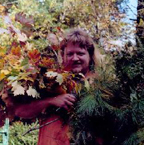 Dallas Denny, M.A., is founder and was for ten years Executive Director of the American Educational Gender Information Service, Inc. (AEGIS), a national clearinghouse on transsexual and transgender issues. She is currently on the board of Gender Education & Advocacy, Inc., AEGIS’ successor organization, which lives at www.gender.org. She is Director of Fantasia Fair and editor of Transgender Tapestry magazine and was editor and publisher of the late Chrysalis: The Journal of Transgressive Gender Identities. Dallas is a prolific writer with hundreds of articles and three books to her credit. She recently decided to retire her license to practice psychology in Tennessee, since she seems to have found a permanent home in Pine Lake, Georgia, pop. 650, the world’s smallest municipality with a transgender nondiscrimination ordinance.
Dallas Denny, M.A., is founder and was for ten years Executive Director of the American Educational Gender Information Service, Inc. (AEGIS), a national clearinghouse on transsexual and transgender issues. She is currently on the board of Gender Education & Advocacy, Inc., AEGIS’ successor organization, which lives at www.gender.org. She is Director of Fantasia Fair and editor of Transgender Tapestry magazine and was editor and publisher of the late Chrysalis: The Journal of Transgressive Gender Identities. Dallas is a prolific writer with hundreds of articles and three books to her credit. She recently decided to retire her license to practice psychology in Tennessee, since she seems to have found a permanent home in Pine Lake, Georgia, pop. 650, the world’s smallest municipality with a transgender nondiscrimination ordinance.
1) You’ve been a trans educator/activist for a long time now: what do you see as the biggest development in terms of trans politics since you’ve been doing this?
When I began my activism in 1989, the community was almost entirely about education– outreach to the general public and information to other transpeople. There wasn’t much information available, and much of that wasn’t very good or was outdated– and even the bad information could be almost impossible to find. The rapid growth of the community in the 1990s and especially the explosion of the internet made information much easier to find.
Somewhere around 1993, the community had reached a point at which political activism had become possible. Of course, some of us had always been doing that, but it hadn’t been a prime focus of the community, and what had been done had been sporadic and short-lived, often was done by a single individual or a small group, and tended to happen in places like San Francisco and New York City. This activism did give us some political gains– most notably in Minnesota, which adopted state-wide protections as early as, I believe, the early 1970s, but around 1993 there was a growing political consciousness in the community, and things just began to take off.
I can identify some important events of the 1990s– when Nancy Burkholder, a post-op transsexual woman, was kicked out of the Michigan Womyn’s conference, when people began to come together in Texas at Phyllis Randolph Frye’s ICTLEP law conference, when the March on Washington turned out to be non-transinclusive, when a bunch of us got together to form GenderPac (an organization which was promptly hijacked by the Executive Director)– but there were two biggies, in my opinion. The first was the first transgender lobbying, which was done by Phyllis Frye and Jane Fee. They couldn’t believe they had actually done it, then wondered why they hadn’t done it before. When HRCF (as it was then called) promptly went behind their backs and removed the transgender inclusions Phyllis and Jane had convinced lawmakers to put into the Employment Nondiscrimination Act, there was a sense of outrage. The news broke when Sarah DePalma got an e-mail.at the law conference. It happened to be the only ICTLEP I attended. We had a coule of strategy sessions and went back home and the next week did actions at at least six Pride events, including Atlanta, which I coordinated. You should have seen the jaws drop when I handed leaflets to the folks at the HRCF booth. The organization has, of course, done a complete turnaround since then, or so we hope.
The other big event was the muder of Brandon Teena; in the aftermath, we began to get media coverage that concentrated on our political issues and not just our individual psychologies or transition histories.
After that, things just exploded. Today many of us– as many as one in three– have some sort of legal protections– anti-discrimination, hate crimes, or both. My little town of Pine Lake, Georgia, population 650, even has trans protections– and I didn’t even have to ask for them. They were already in place when I moved here in the late 1990s.
Continue reading “Five Questions With… Dallas Denny”
 A female-to-male transgendered activist and shaman, Raven Kaldera is a pagan priest, intersex transgender activist, parent, astrologer, musician and homesteader. Kaldera, who hails from Hubbardston, Mass., is the founder and leader of the Pagan Kingdom of Asphodel and the Asphodel Pagan Choir. Kaldera has been a neo-pagan since the age of 14, when he was converted by a “fam-trad” teen on a date. His website,
A female-to-male transgendered activist and shaman, Raven Kaldera is a pagan priest, intersex transgender activist, parent, astrologer, musician and homesteader. Kaldera, who hails from Hubbardston, Mass., is the founder and leader of the Pagan Kingdom of Asphodel and the Asphodel Pagan Choir. Kaldera has been a neo-pagan since the age of 14, when he was converted by a “fam-trad” teen on a date. His website,  Dallas Denny, M.A., is founder and was for ten years Executive Director of the
Dallas Denny, M.A., is founder and was for ten years Executive Director of the